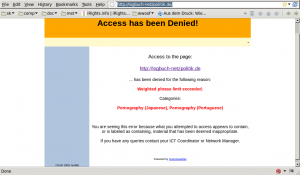ANPR stands for automated number plate recognition.
It’s a camera that can automatically recognise and read license plates on cars and then checks them against a central database. If the plate matches a “vehicle of interest”, the police can then decide to pull over the car and talk to the driver. ANPR cameras are typically deployed in police cars and in fixed installations by the side of the road.
The current state of ANPR in New Zealand
[Edit: there is some inconsistency between the information available over multiple letters from the Police and that reported in Police News.]
[Edit 2: Superintendent Carey Griffiths has denied that the Police will be storing the ANPR data and using it for tracking. We have asked the Police Commissioner for clarification.]
According to the June 2012 edition of Police News, the NZ Police have been trialling ANPR since 2009. This has involved four mobile ANPR units which are not that sophisticated in that they need two people to operate them (one to drive, one to watch the screen).
In theory the trial ended in January 2012 but it is our understanding from Police News that they are still using the current four ANPR vehicles (2 in Auckland, 1 in Waikato/Eastern and 1 in Christchurch/Southland) and are looking at deploying another couple.
We have requested copies of reports about the trial and any recommendations about further deployment of ANPR systems.
Thanks an OIA request by Alex Harris we also have a draft copy of the ANPR manual. There is also an associated letter where the Police report that the trial began in 2010 and has consisted of only two units for a limited time in Counties Manukau and Wellington, with them currently deployed in Counties Manukau and Waitemata.
The Police answer questions about ANPR
Some questions and answers from letters to the police about ANPR (questions are ours, answers are from the Police):
Q. What data is stored with each record (e.g. location, time of day, etc)?
A. The time date and a photograph of all vehicles passing the ANPR camera is stored.
Q. Will this information include the location of the ANPR device at the time of the lookup?
A. Yes it will include the location of where the device was deployed.
Q. How long will the data for each captured license plate be kept for?
A. Data of vehicle movements captured during ANPR deployments will be retained on a secure Police database. In time this information may be deleted with it is no longer required for the purpose it was obtained. Police may search the stored data if there is a belief that there may be information relating to a crime.
Q. Are the police considering using the information stored in the ANPR database to track vehicles?
A. The ANPR system alerts police to vehicles that are a vehicle of interest to police recorded in the vehicles of interest database.
Q. If so, do the police believe they would need to apply for a warrant to use the information in this way?
A. There is no requirement for police to apply for a warrant for any ANPR information as it is gathered in a public place.
Why does ANPR make us worried?
If ANPR was simply used by the police to help find people they are actively looking for, we’d probably have no argument against it.
The problem is that it’s more than just a simple database lookup. That central database isn’t just responding to queries, it’s also storing the date, the time and the place for every car that passes the ANPR camera.
So the police end up with a very big database of car sightings – which gives them the ability to track the movements of any car they wish. Even more worrying is that they can keep this data for as long as they like and therefore “go back in time” by entering queries for any day since the database was started.
The technology is rapidly getting cheaper and could easily end up deployed in every police car and in fixed places around major cities and roads, allowing for near total coverage.
Potential harm
There are three types of harm that can come from creating a new database like this:
- An inappropriate extension of police power that might be used badly. e.g. the Police use it to spy on political activists who are engaged in peaceful protest, breaching their rights to privacy and freedom from Police surveillance.
- Extension to other government departments. e.g. could CYFS access the database to determine that you are feeding your children badly because you park near the local McDonalds each day?
- Improper use. A police officer using it to stalk someone for their own reasons.
Tracking used to be hard
Tracking someone used to be hard and expensive but ANPR is going to make it easy and cheap. With ANPR you don’t need a whole team of people, you don’t need to install a GPS tracking device, you don’t need to get a court order to access mobile phone data – you just install ANPR devices everywhere and then ask the database about whoever you like.
More to the point, you also don’t need to change any laws or apply for a surveillance warrant to install a tracking device – you can just start doing it.
It’s the sort of information that a totalitarian regime would love to have. But is it the sort of information that we want our government to have about everyone?
Shouldn’t we talk about what sort of controls we might want to impose if such a system is implemented?
Are we going to end up with this system watching our every move without even any public debate about it?
